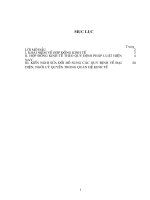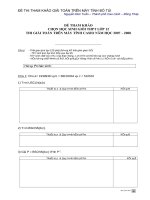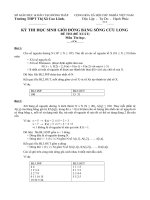8 E 11 DE HK1 2013 DONG THAP
Bạn đang xem bản rút gọn của tài liệu. Xem và tải ngay bản đầy đủ của tài liệu tại đây (113.47 KB, 4 trang )
<span class='text_page_counter'>(1)</span>SỞ GIÁO DỤC VÀ ĐÀO TẠO ĐỒNG THÁP ___________________. ĐỀ KIỂM TRA HỌC KỲ I Năm học: 2012-2013 Môn thi: Tiếng Anh 11 – chương trình chuẩn Thời gian làm bài: 45 phút (không kể thời gian phát đề). Họ và tên thí sinh: _____________________________________ Số báo danh: ___________________ PART A: MULTIPLE CHOICE (7 MARKS) Read the passage and choose the best answer for each question. There are books with fairy tales in many countries. Often the same stories are known and repeated in many different languages. Most fairy tales begin with “Once upon a time” and end with “They lived happily ever after” so we will begin in the same way. Once upon a time there was a girl called Cinderella who did all the work in the kitchen while her lazy sisters did nothing. One night her sisters went to a ball(*) at the palace. Cinderella was left at home, very sad. After a time her fairy god-mother appeared and told Cinderella that she could go to the ball – but to return home by midnight. So she went to the ball in beautiful dress in a wonderful coach. She danced with the prince but at midnight she ran back home, leaving one of her shoes on the dance floor. The prince wanted to see her again and went to every house in the capital until he found that the shoe was the right size for Cinderella. She and the prince were married and lived happily ever after. ------------------------------------------------(*) a formal social gathering for dancing Question 1: Books with fairy tales are found in ____________. A. many countries B. our country only C. all countries except ours D. few countries Question 2: Who worked the hardest at home? A. Cinderella’s sisters B. Cinderella’s step-mother C. Cinderella herself D. Cinderella’s god-mother Question 3: Cinderella was very sad because ____________. A. she did all the work in the kitchen B. her lazy sisters did nothing C. her sisters were invited to a ball D. her sisters went to a ball and left her at home Question 4: Who helped Cinderella to go to the ball at the palace? A. her sisters B. her step-mother C. the prince D. her fairy god-mother Question 5: At the end of the story ____________. A. the prince invited Cinderella to the ball B. Cinderella’s god-mother came to see her C. one of Cinderella sisters was married to the prince D. Cinderella and the prince were married Choose the word whose primary stress is pronounced differently from that of the others.. Question 6: Question 7:. A. rumour A. relation. B. affair B. together. C. party C. successful. D. method D. family.
<span class='text_page_counter'>(2)</span> Choose the word whose underlined part is pronounced differently from that of the others Question 8: Question 9:. A. character A. heat. B. choice B. meat. C. teacher C. ready. D. change D. treat. Choose the underlined word or phrase that needs correcting. Question 10: Question 11: Question 12:. They said when they got to the station, the train leaves. A B C D Nam apologized of breaking the vase. A B C D Mai said that she is enjoying an interesting film on TV the night before. A B C D. Choose ONE sentence that is closest in meaning with the original one. Question 13: As he had failed twice, he didn’t want to try again. A. Having failed twice, he didn’t want to try again. B. Having tried again, he failed twice. C. He tried twice, and he failed again D. He decided to do it once again after having failed twice Question 14: It’s a long time since I saw a movie. A. I spent a long time looking for a movie to see. B. I have seen some movies so far. C. I haven’t seen movies for a long time. D. I saw a movie that took very long time. Choose the best answer to complete each sentence or replace the underlined words or phrases. Question 15: A person who has been chosen to speak or vote for someone else on behalf of a group is called a(n) ______________. A. contestant B. competitor C. examinee D. representative Question 16: Some high-school students take part in helping disadvantaged children. A. donate B. play C. participate D. raise Question 17: Many students voluntarily spent their summer holidays teaching illiterate people to read and write. A. people who are deaf. B. people who are poor. C. people who hate learning D. people who don’t know how to read and write Question 18: A(n) ___________ is one that you simply know a little about but not a close one. A. friend B. acquaintance C. stranger D. uncertain person Question 19: Teenagers often have their _________ who they admire very much. A. idols B. ideals C. images D. admirers Question 20: The first quality for true friendship is _________ A. unselfish B. unselfishness C. selfish D. selfishness Question 21: We are planning __________ several historical sites in Hue..
<span class='text_page_counter'>(3)</span> A. visit B. to visit C. visiting D. visited Question 22: He spends most of his time __________ computer games. A. play B. to play C. playing D. played Question 23: Has ________ arrived yet? It’s time to start now. A. someone B. anyone C. no one D. everyone Question 24: They expected _________ to the party, but they were disappointed. A. to invite B. to be invited C. inviting D. being invited Question 25: He _________ us about his marriage when we ________ afternoon tea. A. told/ were having B. telling/ were having C. told/ was having D. had told/ were having Question 26: Lan: Thank you very much for a lovely party.” Mai: “_________” A. Have a good day B. Come on C. Cheers D. You’re welcome Question 27: Nga: “What type of competition was it?” Hung: “___________” A. General Knowledge Quiz B. It’s the time when people celebrate the harvest C. Mid-Autumn Festival D. It was her birthday. Question 28: Peter: “Do you enjoy the work?” Jane: “_____________” A. Oh, that sound really interesting B. I think the teacher should offer special tutoring lessons C. Yes, I like helping people. D. Well, it makes me appreciate my health more. PART B: WRITING (3 MARKS) Write the correct form of the words in brackets. Question 1: Question 2:. Can you tell me one of your most __________________experiences? (embarrass) They denied ______________________ there. (be). Rewrite the following sentences with the words given in the way that the rewritten one is closest in meaning with the original one. Question 3:. As I have got a credit card, I found it easy to book an airline ticket over the phone. _Having ________________________________________________________ Question 4: “I won’t help you unless I have time” the man said to her. _ The man told her ________________________________________________ Rewrite the following sentences with the words given in brackets in the way that the rewritten one is closest in meaning with the original one. Question 5:. I don’t know the answer, so I can’t tell you. ( if ) ___________________________________________________________ Question 6: “You’re selfish!”, she said. ( accused ) ___________________________________________________________ ……….THE END…….... Answer Keys.
<span class='text_page_counter'>(4)</span> PART A: MULTIPLE CHOICE (7 MARKS) 1 A 15 D. 2 C 16 C. 3 D 17 D. 4 D 18 B. 5 D 19 A. 6 B 20 B. 7 D 21 B. 8 A 22 C. 9 C 23 D. 10 D 24 B. 11 B 25 A. 12 A 26 D. 13 A 27 A. 14 C 28 C. PART B: WRITING (3 MARKS) Write the correct form of the words in brackets. Question 1: Question 2:. Can you tell me one of your most __ embarrassing __ experiences? (embarrass) They denied __ having been __ there. (be). Rewrite the following sentences with the words given in the way that the rewritten one is closest in meaning with the original one. Question 3:. As I have got a credit card, I found it easy to book an airline ticket over the phone. _ Having got a credit card, I found it easy to book an airline ticket over the phone. Question 4: “I won’t come there unless I have time” the man said to her. _The man told her (that) he wouldn’t come there unless he had time Rewrite the following sentences with the words given in brackets in the way that the rewritten one is closest in meaning with the original one. Question 5: Question 6:. I don’t know the answer, so I can’t tell you. ( if ) _ If I knew the answer, I could tell you. “You’re selfish!”, she said. ( accused ) _ She accused me of being selfish..
<span class='text_page_counter'>(5)</span>









